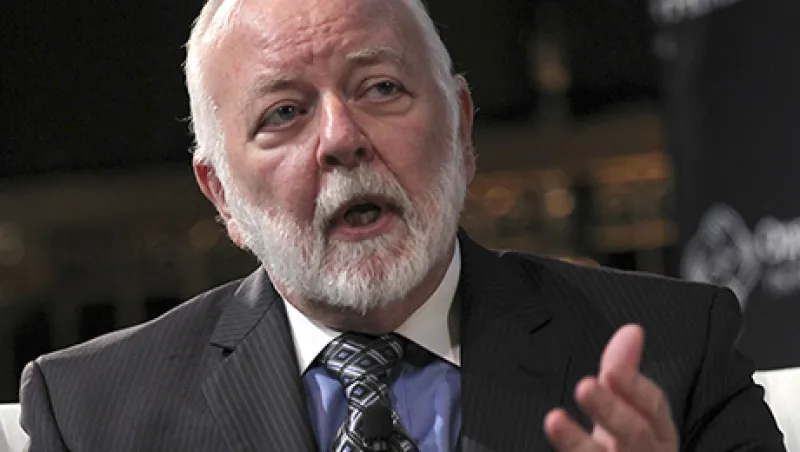Dick Bové, veteran bank and equity research analyst at Garden City, New York–headquartered Rafferty Capital Markets, sees extraordinary strength in the overall U.S. financial sector. Capital as a share of assets is at its highest level since 1938. Liquidity is the most flush it has been in 40 years. In the generally fair skies of the banking industry, however, Bové sees one looming cloud: Citigroup.
After the global bank on April 14 announced earnings for the first quarter that exceeded analysts’ expectations, Bové upgraded his rating of Citi’s stock from a sell to a hold. The bank reported earnings of $1.30 a share on $4.1 billion in earnings on an adjusted basis. Analysts had expected a lower $1.14 per share, according to a poll released in mid-April by Thomson Financial Research and FactSet Research Systems. According to Thomson First Call, 21 of 30 analysts rated Citigroup a buy or strong buy in April, with eight of them rating it a hold and one a sell.
Although Bové sees positive developments at Citi, he remains skeptical about its outlook. For one thing, Citigroup’s return on equity fell in the first quarter, to 7.8 percent from 8.2 percent a year earlier, although that was higher than the 4.8 percent in the fourth quarter of 2013. Michael Corbat, who took over the reins as chief executive officer in October 2012, promised investors in March 2013 that the bank would be able to offer a 10 percent or higher return on tangible common equity by 2015. Since the Federal Reserve rejected Citi’s 2014 capital plan in March, it has looked to be nearly impossible for Citi to reach its goal by the end of next year.
In its submission to the Fed, Citi proposed to raise its quarterly dividend to 5 cents per share and repurchase $6.4 billion of its stock.
The Fed found that the company had failed to adequately design a process to conduct internal stress testing to reflect its full range of business activities and exposures. This result was a stinging setback for Citigroup. But Citi did pass the Fed’s stress test — a success in its own right, based on what Corbat has called an “industrial strength” effort to build a comfortable capital cushion. After the Fed’s rejection of the plan, Citi continues to be limited to a paltry dividend of 1 cent per share and the $1.2 billion in stock repurchases the Fed approved a year ago.
Beyond the company’s failure to pass muster with the Fed, Citigroup also suffered an embarrassment before the Securities and Exchange Commission in the first quarter. In February, the bank disclosed to the SEC that it had discovered a $400 million gap owed to it by Oceanografía, a company that provides oil services to Pemex, Mexico’s state-owned oil company. In April Citi chief financial officer John Gerspach revealed a second breach involving the same parties in Mexico, this time of less than $30 million.
According to Bové, public opinion has been more forgiving of Citi’s present top brass than of its predecessors. But investors remain unconvinced about Citi’s prospects. Even though tangible book value per share rose to $56.40 in the first quarter, the bank’s shares closed at $47.73 as of the market close on May 2. In an interview with Institutional Investor, Bové delves into Citigroup’s recent earnings and outlook, and he outlines the financial company’s strengths and weaknesses.
Institutional Investor: What did Citigroup’s first-quarter earnings report reveal about the state of the company?
Bové: From a balance-sheet standpoint, it was a very positive report. It basically indicated that the company has a massive amount of liquidity and is meeting both the capital requirements of Basel III and the supplementary ratio. It’s the reason I decided to take the stock up to a hold from a sell. From an income statement point of view, basically they took their trading profits up — I’m just going to say for hyperbole — three times, right? I think we’ve got a lot of mark to market, and I think we’ve got the sale of assets in those numbers. I’m not sure the company will show that level of improvement in the next quarter. Their trading will be down.
But the bottom line is: The market is not going to want to sell this stock. So if the market doesn’t want to sell it and if Citi’s balance sheet is in decent condition, I see no reason to keep my sell rating on it. I don’t want to own the stock, however. There is a lot I don’t like about the company.
What don’t you like about Citigroup?
The core problem I have is that over the past 18 years, there were six different administrations in that company. And each one of these administrations — Walter Wriston, John Reed, Sandy Weill, Chuck Prince, Vikram Pandit and now Michael Corbat — has approached the business differently. There is a lack of stability in management and direction. I think it’s showing up in the fact the company’s revenues are flat from where they were a year ago, and they were down in three of the quarters in the interim period.
The core businesses did not grow during the first quarter. The average earning assets were down slightly. Net interest income was down, and they took a big chunk out of reserves to ease that blow. And if you took the capital gain and trading out from “other income,” it doesn’t look like the non-interest-income businesses did very well. Those businesses only cut their cost by about 1 percent. There’s no compelling reason to sell or to buy the company, thus I’ve got a non-entity-hold rating on it.
To what extent has Citi moved past the huge amount of troubled assets they had five years ago?
Of course, the biggest amount of those assets was mortgages. The fact that home prices came up and Citi wrote off a lot of bad mortgages helped to bring down its amount of bad assets. Also, they did sell Smith Barney and other minor businesses. From my perspective, I don’t care about its story on troubled assets. That’s not what drives my thinking. What does drive my thinking is where Citi is going to get the revenues. If you’re looking at trading being where it is in the next quarter, that might be a mistake. In the April 14 conference call, Citi was very hazy about how much of the increase in principal transactions was because of marking to market assets that were not sold. I think they pretty much hinted they were going to be revenue-challenged in the next quarter.
Are you saying Citigroup lacks direction?
Yes. The only vision they have at this point is to cut costs. And I don’t see that as a long-term strategy. Ultimately, you have to generate revenues, and Citigroup has not enunciated a clear policy on this front. For example, the company has outlined a plan for its global consumer finance business, but when you go through the quarterly numbers, however, the one business that stands out as having been disappointing is the global consumer finance business. Where they’ve voiced a strategy, those plans have not borne fruit. In sectors where they have not laid out a clear approach, such as in trading and commercial lending, they’re showing gains.
You suggest that some of these gains may be camouflaged for reasons such as selling assets or marking to market. Is there any reason why trading revenues would increase?
Yes, and it’s a very compelling one. If you take a look at the growth in money supply, M1 has been up 16 percent per year in each of the past three years. M2 has been up over 9 percent per year each of the past three years. That money has got to go somewhere, and that money goes to the wealthiest part of the community, to institutions or between banks and the Fed. The net effect is if you keep driving the money supply higher, you ultimately are going to drive trading higher. That’s a theory I’ve had for some time, but I didn’t think it was going to be as strong as it was. Well, I wrote a piece on Goldman Sachs a few weeks ago saying trading results for the banks are likely to be better than expected. But I had no idea the results would be this good.
What about the quality of the management team? Is that an issue?
I know [CLSA analyst] Mike Mayo was trying to get Citi’s chief financial officer, John Gerspach, fired, which came up during the conference call April 14. But the point is, if you were to look at loan growth globally, commercial- and industrial-lending-wise, you’d say management is doing a decent job. If you were to look at the increase in trading, you would say management is doing a decent job. If you were to look at the flatlining of expenses in a period where litigation is still very strong, again you would have to say management is doing a decent job. So there are certain areas of the company where it does appear management is having a positive impact.
Conversely, if you were to look at the consumer business and the fact that they’ve got these glitches, such as the Mexican $400 million in fraudulent loans [per Citi’s own admission] or the failure to gain the Fed’s approval of their capital plan, you would say management is doing a very bad job. There are some pluses, some minuses, but not enough of either to say they’re terrific or they’re terrible.
What do you make of their failure to pass muster with their capital plan?
I think it goes back to all the management changes. Again, because I’m thinking of this guy who comes in every day to his desk at Citigroup: Every two years, he is getting a different signal. He’s moving from point A to B to C to D to E. While he’s doing that, one of the things he’s not concentrating on is internal controls. I think the failures in Mexico are related to that: the constant shift in terms of direction by management. That’s something that you need to see clarified before getting all enthused about running out and buying Citigroup.
I think that there’s going to be a lot more on that issue, and I think it’s more dangerous than a measly $400 million would suggest. Manuel Medina-Mora, the co-president of Citi, is also the godfather of Banamex, through which Citi operates in Mexico. He has complete control of the global consumer banking business, which of course includes the U.S.
What do you make of the fact the share price continues to trade at a discount to book value, which some analysts see as a buy signal?
Well, I don’t see anything that means I should go out and buy the stock. But there are a lot of people who love this company now. There’s a lot of positive feeling about Corbat and Citi chair Michael O’Neill, who are known collectively as M-squared.
You get a sense about how people feel in how they deal with negative issues. If you were talking about Citigroup in 2007 and a negative issue came up, everybody wanted to nail Prince, who retired November 2007, to a dartboard. Same thing with Vikram Pandit after he took over that December.
Today, no matter what happens in the company, the opinion seems to be that Corbat is handling Citi properly and O’Neill really knows what he’s doing. The net effect is, there is this tremendous sense of goodwill toward the firm, which allows it to pop big whenever there is a positive development.
If the Federal Reserve were to allow Citi to go forward with its capital plan, would that really boost the share price? Or would it be a stepping stone to something bigger?
If they got approval of the capital plan, that would drive the stock higher. I said in March that we’ll have to wait until mid-2015 or even 2016 before you see a dividend increase for that company. I think that view was certified by what Corbat said in the April 14 conference call. He’s not even going to ask for an increase in the dividend until the 2015 submission to the Federal Reserve for a new capital plan.
Until we see growth in revenues, should we be cautious about Citigroup?
I think so. I think so.
Get more on corporations.






